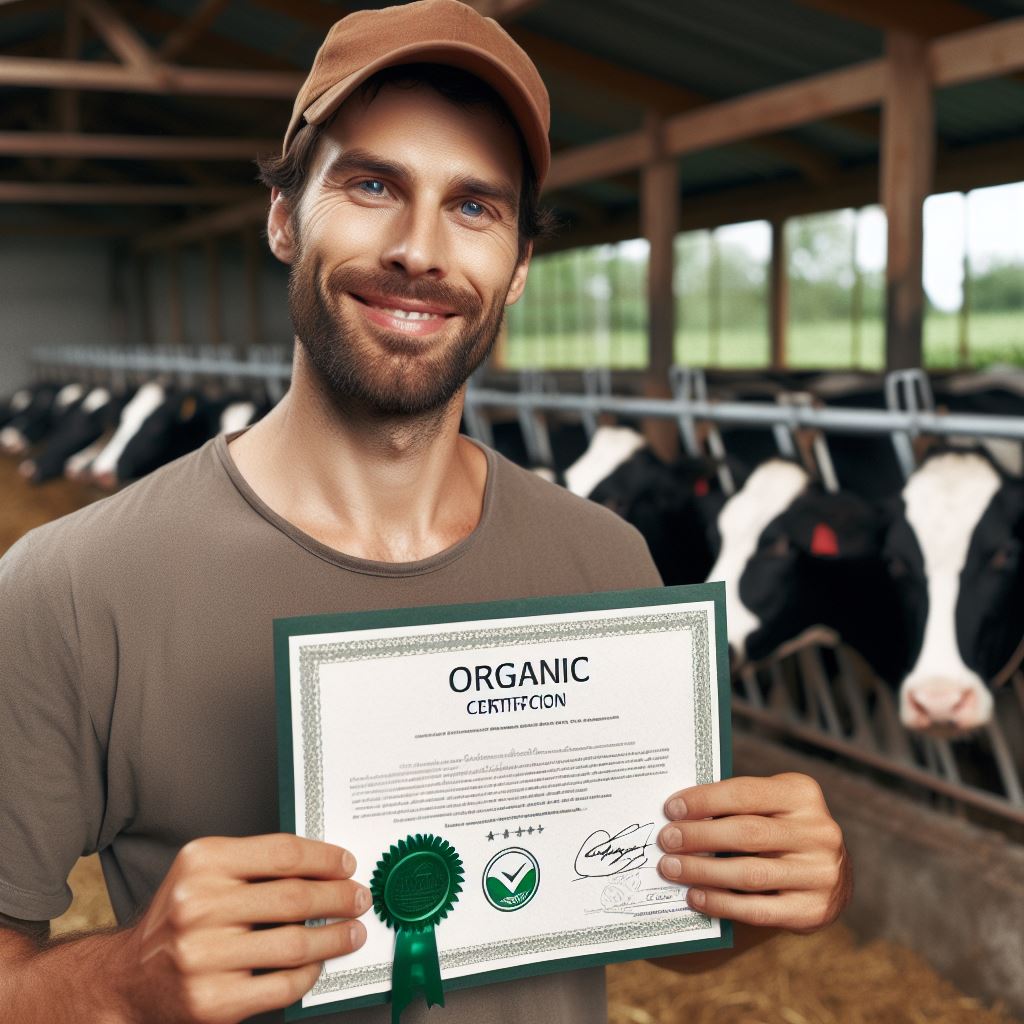Introduction
Definition of organic animal health care
Organic animal health care is a practice that focuses on using natural methods to enhance the well-being and treat illnesses of animals.
Unlike conventional animal health care, which relies heavily on synthetic chemicals and antibiotics, organic animal health care utilizes a more holistic and sustainable approach.
Why organic animal health care is important
The use of organic methods in animal health care is essential for several reasons.
Firstly, it promotes the overall health and welfare of animals.
By providing them with a balanced diet, regular exercise, and natural remedies, their immune systems are strengthened, reducing the risk of diseases and enhancing their overall quality of life.
Secondly, natural animal healthcare helps to prevent the buildup of antibiotic resistance.
Overuse of antibiotics in conventional animal health care has led to the development of antibiotic-resistant bacteria, which pose a serious threat to both animal and human health.
By reducing the use of antibiotics and employing natural alternatives, such as herbal remedies and dietary supplements, natural animal healthcare plays a vital role in preserving the effectiveness of antibiotics for future generations.
Finally, organic animal health care contributes to environmental sustainability.
Unlike conventional practices, organic methods minimize the use of synthetic chemicals and antibiotics, reducing the pollution of air, water, and soil.
By prioritizing natural and eco-friendly solutions, natural animal healthcare supports a healthier and more sustainable environment for all.
In general, natural animal healthcare offers numerous benefits for animals, humans, and the environment.
By embracing natural and holistic approaches, we can ensure the well-being of our animal companions while preserving the effectiveness of antibiotics and protecting the planet for future generations.
The Benefits of Organic Animal Health Care
Improved animal welfare
Natural animal healthcare focuses on holistic and preventive measures.
Animals receive proper nutrition, exercise, and living conditions to ensure their well-being.
Transform Your Agribusiness
Unlock your farm's potential with expert advice tailored to your needs. Get actionable steps that drive real results.
Get StartedRegular health monitoring and early treatment help minimize animal suffering.
Reduced use of antibiotics and hormones
Organic animal health care promotes natural immunity and disease prevention strategies.
Antibiotics are only used as a last resort and strictly following organic standards and regulations.
Reduced antibiotic use helps prevent the spread of antibiotic-resistant bacteria in animals and humans.
Hormones are not used in natural animal healthcare, avoiding potential health risks for both animals and consumers.
Higher quality and safer products
Organic animal health care ensures animals are raised without synthetic pesticides, GMOs, or growth promoters.
Organic products are free from residues of harmful substances, offering healthier choices for consumers.
Animals raised organically produce meat, milk, and eggs that are more nutritious and flavorful.
Environmental sustainability
Organic animal health care practices protect ecosystems and conserve natural resources.
Sustainable farming techniques, such as rotational grazing, minimize soil erosion and promote biodiversity.
Organic farmers use natural fertilizers and avoid chemical pesticides, minimizing water pollution and promoting soil health.
Organic animal agriculture contributes to reducing greenhouse gas emissions and combating climate change.
Generally, organic animal health care provides various benefits that contribute to the overall well-being of animals, consumers, and the environment.
It prioritizes animal welfare by adopting holistic approaches, ensuring proper nutrition, exercise, and living conditions.
By reducing the use of antibiotics and hormones, organic practices help prevent the spread of antibiotic-resistant bacteria and eliminate potential health risks.
Moreover, organic products are of higher quality, free from harmful residues, and offer healthier choices for consumers.
Lastly, environmental sustainability is greatly emphasized in organic animal health care through the use of sustainable farming techniques and the reduction of greenhouse gas emissions.
By choosing organic animal health care, we support a more compassionate, sustainable, and healthier future for both animals and humans.
Read: Ethical Meat Production Guide
Common Organic Animal Health Care Practices
When it comes to organic animal health care, several common practices can help maintain the well-being of animals naturally.
These practices focus on preventive measures, herbal and natural remedies, and holistic approaches.
Natural preventive measures
Proper nutrition is essential to keep animals healthy.
Providing them with a well-balanced diet rich in natural and organic ingredients ensures they receive all the necessary nutrients to thrive.
This includes high-quality animal feed that avoids the use of synthetic chemicals, hormones, and antibiotics.
Showcase Your Farming Business
Publish your professional farming services profile on our blog for a one-time fee of $200 and reach a dedicated audience of farmers and agribusiness owners.
Publish Your ProfileClean and comfortable living conditions are equally important.
Maintaining a hygienic environment for animals helps prevent the spread of diseases and reduces the risk of infections.
Regular cleaning of animal housing, providing adequate ventilation, and ensuring proper waste management are crucial components of this preventive measure.
Additionally, regular exercise plays a vital role in promoting good health among animals.
It helps them maintain a healthy weight, improves cardiovascular function, and strengthens their immune systems.
Activities such as daily walks, playtime, or providing ample space for animals to move around are all beneficial.
Herbal and natural remedies
Herbal supplements are commonly used to support animals’ health and well-being.
These supplements can provide additional nutrients, boost immune function, and aid in various aspects of animal health.
For example, echinacea is known for its immune-enhancing properties, while garlic is considered a natural antibiotic and can help fight infections.
Essential oils are another valuable resource in organic animal health care.
They can be used topically or aromatically to address various conditions such as skin irritations, insect bites, or respiratory issues.
Lavender oil, for instance, has calming effects and can help relieve anxiety and stress in animals.
Homeopathic treatments are widely used in organic animal health care.
These treatments involve using highly diluted substances to stimulate the body’s natural healing mechanisms.
They are believed to work by addressing the underlying causes of health problems rather than simply suppressing symptoms.
Holistic approaches
In addition to natural preventive measures and herbal remedies, holistic approaches can play a significant role in organic animal health care.
Acupuncture and chiropractic care can be beneficial for animals, just as they are for humans.
These practices involve stimulating specific points or adjusting the spine to restore balance and address specific health issues.
They can help relieve pain, improve mobility, and enhance overall well-being.
Massage therapy is another holistic approach widely used in animal health care.
It improves circulation, helps reduce muscle tension, and promotes relaxation.
Regular massage sessions can aid in injury recovery, stress reduction, and maintaining optimal physical health.
Alternative therapies, such as aromatherapy and meditation, are also effective in reducing stress and promoting overall wellness in animals.
Certain scents, like chamomile or lavender, can help calm animals and alleviate anxiety.
Meditation techniques, adapted to suit animals, can enhance their mental and emotional state.
Overall, organic animal health care embraces a wide range of practices that prioritize natural and holistic approaches.
By focusing on preventive measures, herbal and natural remedies, and holistic therapies, animals can enjoy optimal health and well-being.
Read: Sustainable Livestock Feed Ideas
Challenges of Organic Animal Health Care
Limited availability of organic treatments
The organic animal health care industry faces challenges due to the limited availability of organic treatments.
Many pharmaceutical companies focus on developing conventional treatments, neglecting organic alternatives.
The lack of research and development in organic treatments hinders their availability and effectiveness.
Organic treatments are often not as readily available in rural areas, making it difficult for farmers to access them.
Higher costs
The cost of organic animal health care is a significant challenge for farmers and animal caretakers.
Organic treatments tend to be more expensive than conventional ones due to the limited supply and higher production costs.
The cost of sourcing organic ingredients and the process of obtaining organic certifications contribute to higher prices.
The increased costs of natural animal healthcare can put financial strain on small and medium-sized farms.
Lack of standardized guidelines and certifications
Another challenge faced by natural animal healthcare is the lack of standardized guidelines and certifications.
The absence of specific regulations and standards for natural animal healthcare products confuses customers.
The lack of consistency in organic certifications makes it challenging for consumers to identify genuine organic products.
Without standardized guidelines and certifications, it is difficult for farmers to ensure they are using genuine organic treatments.
Showcase Your Farming Business
Publish your professional farming services profile on our blog for a one-time fee of $200 and reach a dedicated audience of farmers and agribusiness owners.
Publish Your ProfileResistance from the traditional livestock industry
The organic animal health care industry often faces resistance from the traditional livestock industry.
Traditional livestock farmers may be skeptical about the effectiveness and benefits of organic treatments.
The traditional livestock industry has deep-rooted practices and may resist switching to organic animal health care.
The influence of large conventional livestock companies can make it hard for the organic industry to gain acceptance and support.
Therefore, organic animal health care faces several challenges that hinder its development and adoption.
The limited availability of organic treatments, higher costs, lack of standardized guidelines and certifications, and resistance from the traditional livestock industry are significant hurdles.
Overcoming these challenges is crucial for the growth and success of organic animal health care in promoting sustainable and holistic animal welfare.
Read: Eco-Friendly Livestock Shelters

Promoting Organic Animal Health Care
Educating farmers and livestock owners
Conduct workshops and seminars on the benefits of natural animal healthcare.
Provide educational materials such as pamphlets and brochures with detailed information.
Collaborate with agricultural universities and research institutions to offer training programs.
Organize farm visits and demonstrations to showcase successful implementation of organic practices.
Government support and incentivization
Offer tax incentives and subsidies for farmers who adopt natural animal healthcare practices.
Establish regulatory frameworks and standards to ensure the quality and safety of organic products.
Allocate funding for research and development in the field of natural animal healthcare.
Implement certification programs to verify organic claims and build consumer trust.
Collaboration and knowledge sharing
Facilitate partnerships between organic animal health care practitioners and traditional veterinarians.
Encourage the formation of industry associations and forums to exchange ideas and best practices.
Establish online platforms and forums for farmers to share their experiences and seek advice.
Foster collaboration among research institutions to conduct studies on natural animal healthcare.
Consumer demand for organic products
Conduct awareness campaigns highlighting the health and environmental benefits of organic animal products.
Educate consumers about the negative impacts of conventional animal farming on their health.
Collaborate with retailers to stock a wide range of certified organic animal products.
Encourage organic animal farmers to directly engage with consumers through farmers’ markets and community-supported agriculture.
Overall, promoting natural animal healthcare requires a holistic approach involving education, government support, collaboration, and increased consumer demand.
By empowering farmers and livestock owners with knowledge and resources, organic practices can be widely embraced, leading to healthier animals and a more sustainable agriculture industry.
Read: Top Feeding Tips for Healthy Sheep
Case Studies and Success Stories
Farmer testimonials
- John, a farmer who implemented natural animal healthcare practices, shares his success story.
- He noticed significant improvements in his livestock’s overall health and well-being.
- John explains how adopting a holistic approach to animal care resulted in reduced veterinary visits.
- He mentions the positive impact on his farm’s productivity and profitability.
- Another farmer, Sarah, also shares her experience with natural animal healthcare.
- She talks about the remarkable improvement in her animals’ immune systems and disease resistance.
- Sarah emphasizes the importance of nutrition, natural remedies, and keeping stress levels low.
- Both farmers highlight the satisfaction they feel in providing their animals with optimal care.
- They express their gratitude for the positive outcomes they achieved through organic practices.
Veterinary perspectives
- Veterinarian Dr. Smith believes in the effectiveness of organic animal health care.
- He recounts a case where traditional medications failed, but natural remedies resolved the issue.
- Dr. Smith advocates for a preventative approach that fosters the animal’s natural defenses.
- He explains how organic practices focus on enhancing the animal’s overall well-being.
- Another veterinarian, Dr. Johnson, shares his experiences with organic health care.
- He mentions cases where animals experienced fewer side effects from organic treatments.
- Dr. Johnson discusses the importance of educating farmers about organic options.
- Both veterinarians acknowledge the growing demand for natural animal healthcare.
- They encourage fellow professionals to explore and embrace these practices.
Implementing organic healthcare practices on a larger scale
- Agricultural organizations have taken notice of the benefits of natural animal healthcare.
- They have funded studies and pilot programs to demonstrate the effectiveness of these practices.
- Several farms have transitioned to entirely natural animal healthcare programs.
- These farms serve as successful examples and inspire others to follow suit.
- Government subsidies and support have played a crucial role in incentivizing the adoption of organic practices.
- The growing consumer demand for organic products further drives the need for organic animal health care.
- Larger-scale implementation of organic practices requires collaboration between farmers, veterinarians, and researchers.
- Research institutions are conducting studies to refine and improve organic health care practices.
- Overall, the case studies and success stories demonstrate the positive impact of organic animal health care.
Through farmer testimonials, veterinary perspectives, and larger-scale implementation efforts, it becomes evident that organic animal health care is a promising approach.
The holistic and preventative approach of organic practices contributes to the overall well-being of the animals while reducing reliance on medications and interventions.
Conclusion
Recap of the importance and benefits
It is crucial for ensuring the well-being of livestock and promoting sustainable farming practices.
It prioritizes natural remedies and preventative measures, reducing the use of harmful chemicals in animal care.
Organic practices also contribute to the overall health of the environment, minimizing pollution and protecting biodiversity.
Encouragement for more farmers and livestock owners to consider organic practices
By adopting organic animal health care, farmers can enhance the quality of their products and gain a competitive edge in the market.
Consumers are increasingly demanding organic and ethically produced products, creating new market opportunities for organic farmers.
Moreover, organic practices can lead to lower veterinary costs and decreased reliance on antibiotics, benefitting both animals and farmers financially.
Final thoughts and call to action
It is time for farmers and livestock owners to embrace natural animal healthcare and take a proactive role in preserving the environment.
By supporting organic practices, we can ensure the well-being of animals, promote sustainable farming, and safeguard our own health.
Let us work together to make natural animal healthcare the new standard in animal husbandry, securing a healthier and more sustainable future for all.




